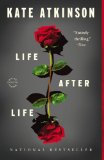Book Club Discussion Questions
In a book club? Subscribe to our Book Club Newsletter!
Please be aware that this discussion guide will contain spoilers!
- Ursula Todd gets to live out many different realities, something that's impossible in real life. Though there is an array of possibilities that form Ursula's alternate histories, do you think any and all futures are possible in Ursula's world, or are there certain parameters within which each life is lived?
- As time goes on, Ursula learns more about her ability to restart her life—and she often changes course accordingly, but she doesn't always correct things. Why not? Do you think Ursula ever becomes completely conscious of her ability to relive and redo her lives? If so, at what point in the story do you think that happens? And what purpose do you think she sets for herself once she figures it out?
- Do people's choices have the power to change destiny? How do you think Ursula's choices are either at odds with or in line with the ideas of fate and destiny throughout the story?
- Do you think Ursula's ability to relive her life over and over is a gift or a curse? How do you think Ursula looks at it? Do you think she is able to embrace the philosophy amor fati ("love of fate," "acceptance") in the end?
- Small moments often have huge ramifications in Ursula's life. Do you think certain moments are more crucial than others in the way Ursula's life develops? Why, and which moments?
- Life After Life encapsulates both the big picture (the sweep of major global historical events) and the small picture (the dynamics of Ursula's loving, quirky family). How are these pictures tied together? When do Ursula's decisions affect the big picture more, or the small picture more? When do they affect both?
- How does Atkinson portray gender throughout the story? How does she comment on the gender roles of this time period, and which characters challenge those roles—and how?
- How does Atkinson's humor pepper the story? In what ways is she able to bring a bit of comedy to her characters and their stories as relief from the serious and dark subject matter?
- How do the various relationships within the Todd family shape the story? What is the significance of maternal bonds and sibling bonds in the story?
- How does Atkinson capture the terror and tragedy of the Blitz? How does war become its own character in the book? What type of commentary does Atkinson make on the English approach to war? Why do you think Atkinson portrayed one of Ursula's lives in Germany, experiencing war and the bombing from the opposing side?
- Ursula faces a bleak end in Germany with her daughter, Frieda. She chooses death over life for the first time, saying, "Something had cracked and broken and the order of things had changed." What do you think she means by that? Is this a significant turning point to Ursula's story? Do you think the end of this life affects her decisions in other lives that follow?
- Klara says, "Hindsight's a wonderful thing. If we all had it there would be no history to write about." Do you think this is true? In what ways does the use of hindsight come to pass in the book?
- "'Well, we all get on,' Sylvie said, 'one way or another. And in the end we all arrive at the same place. I hardly see that it matters how we get there.' It seemed to Ursula that how you got there was the whole point…". Do you agree with Sylvie or with Ursula? How does this relate to a philosophy raised by Dr. Kellet—that "sometimes a bad thing happens to prevent a worse thing happening"?
- Along similar lines, Ursula says to Teddy, "You just have to get on with
life…We only have one after all, we should try and do our best. We can never get it right, but we must try." And Teddy responds, "What if we had a chance to do it again and again until we finally did get it right?" What do you think it means to get things right? Is Ursula attempting to make things "right" in life each time she's reborn? If so, which things in particular—and how?
- Ralph asks Ursula if she could have killed Hitler as a baby, and Ursula thinks, "If I thought it would save Teddy…Not just Teddy, of course, the rest of the world, too." Do you think Ursula ultimately had to choose between saving Teddy and saving "the rest of the world"? If so, why did she choose as she did? And was she able to save either?
- Life continues to restart over and over for Ursula and the Todd family, and outcomes vary greatly each time. What happens to the characters changes drastically in many of the versions. Do you feel the characters change just as drastically, in terms of who they are and what they are like? Or do you think they fundamentally stay the same? Ursula learns many things about life and its progression, but does she herself change over the course of the book?
- What are the biggest questions this book raised for you? How did it change the way you think about the course of your own life?
Unless otherwise stated, this discussion guide is reprinted with the permission of Back Bay Books.
Any page references refer to a USA edition of the book, usually the trade paperback version, and may vary in other editions.
